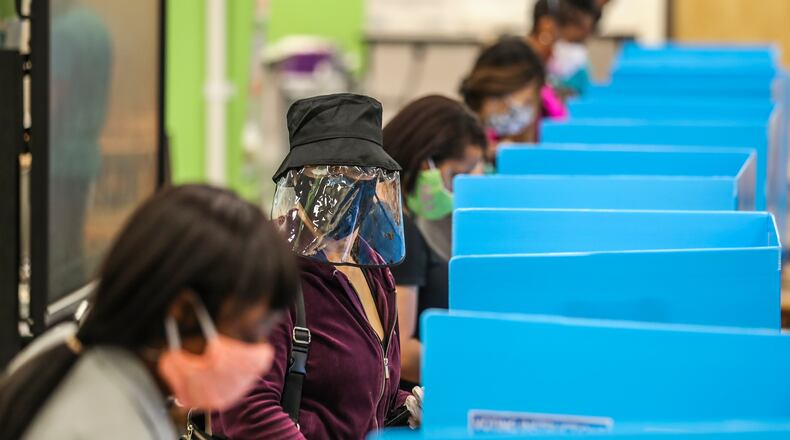Ballots were still being counted Wednesday in some primary races, but battle lines have been drawn for the November election as Democrats fight to take control of the Georgia House.
Republican groups in Georgia and nationwide have set their sights on taking down House Minority Leader Bob Trammell, who beat challenger Frederick Manley in the primary.
Trammell is one of the Legislature’s few remaining rural Democrats, and the Republican State Leadership Committee — a national group that works to elect Republicans across the country — put a target on his Luthersville-based district that voted for Donald Trump in the 2016 presidential contest. The GOP group is pushing retired U.S. Army Capt. David Jenkins, who defeated Gene King in Tuesday’s Republican primary, and it said it has spent more than $20,000 to flip House District 132 — with plans to invest millions more in the state.
“It’s no surprise that the lobbyists and special interests in Washington are coming after me,” Trammell said. “I also think it’s a reflection of the reality that Georgia is a battleground state. And they understand that the state is definitely in play and that the Statehouse is in play in November.”
With that in mind, the party leader said he is going to work to help Democrats chip away at, and hopefully take away, Republican control of the chamber. Republicans have controlled both of Georgia’s legislative chambers since 2005, but Democrats are battling to flip at least 16 of the House’s 180 seats to gain control.
The best way for them to do that, he said, is to focus on the issues — including expanding access to health care, opposing tax breaks for millionaires and working to increase teacher pay.
“At the end of the day, we trust our neighbors, and I think that the causes we’re fighting for in the House as Democrats are causes that Georgians identify with,” Trammell said.
House Speaker David Ralston said that with most November races being set, he is ready to get to work not only protecting the chamber's Republican majority, but expanding it.
And he, like Trammell, intends to focus on the issues. Ralston pointed to the Legislature making changes to the state’s criminal justice system and working to improve quality of life in rural parts of the state.
“And now we find ourselves in this pandemic,” Ralston said. “What I’m going to ask Georgians is, do you really want to turn around and head in a completely different direction from that which we have been on? Or do you want an approach that will emphasize good jobs for Georgians, good educational opportunities for Georgians — both k-12 and higher education — better access to health care. I think those are the things Georgians care about.”
Both parties have set their sights on several races in Atlanta’s northern suburbs, where Democrats have gained in previously Republican strongholds.
In Gwinnett County, two state Senate seats are up for grabs after senators launched unsuccessful bids for Congress.
Republican Clint Dixon and Democrat Matielyn Jones emerged from their three-way primaries for a Buford-based seat, setting the November contest.
State Sen. Renee Unterman, a Buford Republican, represented Senate District 45 for 18 years, and she won the Gwinnett County seat in 2018 with 58% of the vote. But new names on the ballot in the diverse district make the contest less sure for either party.
After state Sen. Zahra Karinshak, a Duluth Democrat, flipped Senate District 48 two years ago, Republicans see an opportunity to take it back.
Physician Michelle Au handily defeated businessman Josh Uddin in the Democratic primary, getting nearly 76% of the vote, according to AP results. Republican attorney Matt Reeves, who lost to Karinshak two years ago and did not have a primary opponent this year, is hoping to finish what he started in 2018.
Incumbent out, others in runoffs
On the coast, former state Rep. Buddy DeLoach of Townsend defeated incumbent state Rep. Jeff Jones of Brunswick in the House District 167 Republican primary. DeLoach served from 1995 to 2005. Jones was elected in 2015.
DeLoach will head to the Statehouse next year, since no Democrat is running for the seat.
Two races remained unclear for Democratic incumbents.
State Rep. Pam Dickerson had fallen behind challenger Sharon Henderson in Conyers-based House District 113, according to Associated Press results.
And it was unclear who would win the Democratic primary in Smyrna-based House District 32. State Rep. Teri Anulewicz was narrowly leading Democratic socialist candidate Asher Nuckolls, according to the AP.
Neither race has a Republican on the ballot in November.
As of Wednesday evening, two longtime Democratic incumbents appeared to be heading to runoffs on Aug. 11 because none of the candidates in their races received more than 50% of the votes cast.
State Rep. Sharon Beasley-Teague, a Red Oak Democrat who has served in the House since 1993, slightly trailed Mandisha Thomas in House District 65.
State Rep. Michele Henson, a Stone Mountain Democrat who's been in office since 1991, will face attorney Zulma Lopez in the runoff for House District 86.
Neither of the races have Republicans on the ballot, so the winners of the runoffs will win the seats.
November fight for control
For years, legislative contests have been decided during the primary election due to districts being drawn in ways that make most of them solidly Republican or solidly Democrat.
But this year, more than half of the legislative races — 120 — are being contested in the general election, up from about 100 two-party races in 2018 and a marked jump from 2016, when voters in only about 50 districts had a choice after the primary. And demographic shifts since the lines were last drawn have put more races in play.
Democrats in 2018 picked up 11 seats in the House and two in the Senate — the biggest gains by the party in about 20 years — mostly in Atlanta’s northern suburbs. In 2016, Democrats won both Cobb and Gwinnett counties in the presidential election for the first time since Jimmy Carter was on the ballot.
This year’s election is especially important for both parties if they want a strong say in how lawmakers draw new voting districts after the 2020 census. If Republicans succeed in maintaining control of both chambers, Democrats could face another decade struggling to gain ground in the Legislature.
About the Author
Keep Reading
The Latest
Featured



